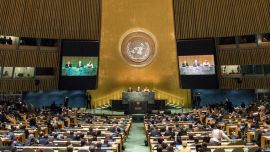Three judges in Argentina on Wednesday suspended labour law changes that form part of President Javier Milei’s mega-decree of sweeping economic reforms and deregulation.
The CGT (General Confederation of Labour) umbrella union grouping had challenged the changes, which technically took effect last Friday, on grounds that they erode basic worker protections such as the right to strike and parental leave.
The three judges of Argentina's labour appeals chamber (Cámara Nacional de Apelaciones del Trabajo) froze elements of Milei's decree which, among other things, increased the legal job probation period from three to eight months, reduced compensation in case of dismissal, and cut pregnancy leave.
Judge Alejandro Sudera also questioned the "necessity" and "urgency" of the decree Milei signed on December 20 – just days after taking office – and thereby suspended the measures until they can be properly considered by Congress.
The injunction marks at least a temporary victory for the CGT, Argentina’s most powerful labour grouping.
Some of the measures appeared to be "repressive or punitive in nature" and it was not clear how their application would aid Milei's objective of "creating real jobs," Sudera wrote in a ruling distributed to the media.
Solicitor General Rodolfo Barra said that the government will appeal Wednesday's ruling.
Milei’s press office also confirmed that his administration would appeal and said the ruling contradicts other courts at the municipal and provincial level.
For now, the court’s injunction still avoids a worst case scenario for Milei where the entire decree is thwarted by either Congress or the courts.
Lawmakers still have time to vote for or against the whole decree in Congress.
Protests ahead
Thousands took to the streets last week to protest the reforms proposed by Milei, who won the November run-off election with promises of slashing state spending as Argentina deals with an economic crisis, including triple-digit inflation.
The CGT has called a general strike for January 24 – the first of the Milei administration and a major challenge to Security Minister Patricia Bullrich’s hardline approach to policing protest.
Milei’s measures have drawn heated debate among jurists about their constitutionality and is the subject of several court challenges.
When he announced his mega-degree, Milei said the goal was to "start along the path to rebuilding the country... and start to undo the huge number of regulations that have held back and prevented economic growth."
The decree changed or scrapped more than 350 economic regulations in a country accustomed to heavy government intervention in the market.
It eliminates a law regulating rent, envisages the privatisation of state enterprises and terminates some 7,000 civil service contracts.
Argentina’s economy is on its knees after decades of debt and financial mismanagement, with inflation surpassing 160 percent year-on-year and more than 40 percent of the population living in poverty.
Milei has pledged to curb inflation, but warned that economic "shock" treatment is the only solution and that the situation will get worse before it improves.
The 53-year-old won a resounding election victory on a wave of fury over the country's decades of economic crises marked by debt, rampant money printing, inflation and fiscal deficit.
His rival candidate, ruling coalition hopeful and former economy minister Sergio Massa, failed to convince voters that he could lead Argentina out of economic quagmire.
Milei has targeted spending cuts equivalent to five percent of gross domestic product. Shortly after taking office, his administration devalued the peso by more than 50 percent, and announced huge cuts in generous state subsidies of fuel and transport.
Milei has also announced a halt to all new public construction projects and a year-long suspension of state advertising, among other measures.
– TIMES/AFP/BLOOMBERG























Comments